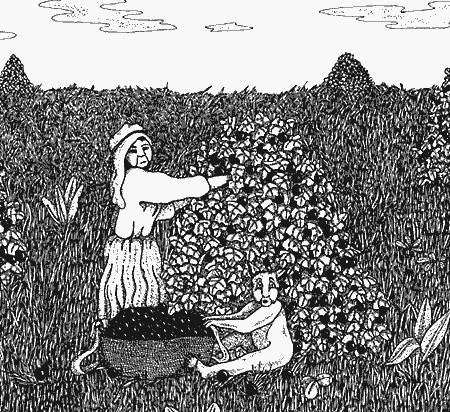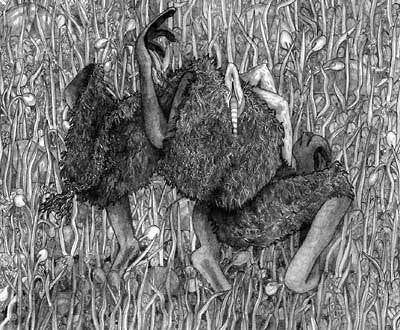
I haven’t been keeping up with the blog this past few days because I’ve been working on a piece of fiction. I sent it off to the slush pile last night and decided I’d better get something new up on here as my next priority, but I couldn’t for the life of me think of what to write about. That’s one of the biggest challenges, for me: what to write about in this thing. When I’m in a certain mood, which is admittedly
much of the time, it all seems so uninteresting, or like writing about myself like this must come across as self-obsessed, hubristic. I threw the question open to my friends this time, and one said that he’d be interested in hearing about my writing process.
Now, this immediately raises in me two conflicts. One, who the Hell am I to write all knowingly-like about my “writing process”? Luckily, I thought of that before I could even bring my self to set fingers to keyboard for this project. I already answered that and named the blog accordingly. I’m nobody in particular; I’m Some Random Chick. The other conflict, though, is that I want immediately upon hearing this kind of thing to protest that I have nothing so grandiose as a “writing process”. That makes it sound so respectably organized, so responsible and planny and stuff. The truth is I feel like I have something approaching a messy, often desperate kind of anti-process. I’ve certainly developed a disciplinary process about writing, as described in the post about how Derren Brown gave me an idea about how to try to kick my own butt into gear, but when I asked my friend he said, as I feared, that’s not what he meant, so I’m not getting off that easy.
One point to this whole silly autobioblog idea of mine is to take that kind of knee-jerk response and, well, really examine it. Because of course that’s dumb – of course there’s a process. It may be a messy, often inadequate, and at the moment very rusty process, but it is, I have to admit, a process. So sure, let’s talk about that, and about some of the ways that I’m the kind of fiction writer

who’s not really cut out to make it big in the mainstream way (but it sure would be sweet to luck out!). What about non-fiction? I don’t know yet; you tell me.
I never really had the chance to decide to do something like “just write for a living”, and the writing courses I’ve taken were far between, long ago, and conflicted with each other. It didn’t even occur to me “to write” until my mid-20’s. Sure, before that I’d dabbled with a story here and a poem there and shown some modest talent for stringing words together (hardly surprising given that I was raised by a professional storyteller), but it hadn’t yet grabbed hold of my brain and told me that it’s one of the things that heals my psyche, when I can do it. It hadn’t yet come forth as something I might actually, in the long run, be pretty good at. I hadn’t yet become consumed by it.
Slightly more than half my life later and I look back to see that I do have talent, but it’s taken me this long to develop any real skill. The story I just sent off, last night, to an ambitiously major magazine "is" one I wrote 17 years ago. I shopped it around the magazines, as one does, getting here and there some valuable feedback and incorporating it, and then All Those Years came along and I wasn’t writing (or drawing or painting or carving or sculpting or much living). Now that I’m working again, I started thinking about that story, one of my favorites I ever wrote, so I pulled it up. And you know what? It was clumsy. Sometimes it rushed to make a point but failed to underpin it, other sections were far too technical for the story around them. I sacrificed good structure to cling to descriptions I liked too much. I was obsessed with flowery foofaraw. The main character – the only character – was like a chess piece, being transported from here to there by way of a sketchy story to show the readers a really cool setting, and I’d missed every opportunity to build the world of his society.

And that brings us to my First Major Problem (in no particular order). I have a very strong tendency to write to settings. I come up with a super neato way something could work, or live, or Do Stuff, plant it in a really great setting with lots of attention to detail and continuity zeal, and then… nothing really happens. I mean, stuff does happen, but it’s kind of like watching a nature documentary or
something. Not really what you’d call a story. That’s something I’ve been working on consciously and subconsciously for decades with, I thought, no real progress, because – and I am literally defining this for myself right now, folks, for the first time – I was mistaking writing in vignettes for writing without story and was trying to make myself stop something that I’m good at, which comes naturally to me. I think I’m better at it now, though. In the last couple of years stories have come upon me and I’ve jotted the ideas down and what do you know, there’s actually tension, development, action, dilemma. Maybe I’m getting the hang of it.
Obviously I think this story’s pretty hot shit now or I wouldn’t have sent it to this magazine in the first place (you lose nothing by aiming high), but who knows, maybe I’ll revisit it in ten years and see how flat it is after all. Not gonna look back from there ‘til I get there though. I ended up adding more than 14,000 words but by the same token might have cut it in half, to get it to where I want it, which brings us to my Second Major Problem: the modern publishing industry has a lot of standards going on and one of those is standard lengths. I know a lot of writers, possibly even most writers, start with length. “I’m going to write a short story”; “this shall be a trilogy”, and so on. I just can’t do that, any more than I could crop all my photos to standard formats or paint strictly to frame sizes. It’s just not in me. It means I often end up with things of inconvenient length – 63,000 words, say, or 21,000, or 125. I write something until it’s done, until it’s the way it needs to be and all the words are in the right place. That makes it extremely awkward when people say things like, “You know, the more mainstream publishing houses will give this more of a shot if you just add 40,000 words”. I know. I know they will. But it’s done the way it is. “Well”, they say then, “you’ll never make a living doing this that way.”
They’re right and they’re wrong. The fiction I write from the heart is what it is and no, I’m not going to add or chop parts of to make it fit a niche on length alone and no, this isn’t going to win me any friends in the publishing industry – and I do see where they’re coming from, don’t get me wrong, but not everyone is geared up to be able to work that way.

Once an editor told me to “add more compelling scenes” – that, I can get behind. Just “add more words”? Not so much. But that’s not all fiction, it’s my fiction. If I had the opportunity to follow someone else’s vision, I could do that: if someone hired me up front to do a series or something, I could write to length, it just wouldn’t always turn out the way I thought it was best but that wouldn’t be my call and that would be fine with me. And regarding nonfiction, I don’t actually seem to have this problem at all.
But is any of this about my “process”? I’ll try to be more concrete. Let’s use fiction; writing this blog is entirely different. I start, thus, from the settings, mostly. Sometimes a story but more often a place, society, event, or what have you within which characters can be placed. Then I figure out who it’s happening to, if not yet fully what's happening, and make me up some characters. Many of these don’t survive long as characters (and in the novel I’m currently working on, most of the ones who do, don’t survive long as it is). Then I write a lot of over-the-top blather about what the wildlife’s like, character backstory irrelevancies, unnecessary dialogue, and so on but completely forget to describe what the characters look like (which sometimes I leave that way on purpose – whatever you, my reader, thinks he looks like, sure, that’s what he looks like. Does it matter?). Then I get excited trying to figure out what actually happens in the thing, and write a timeline kind of affair which will usually bear no resemblance to the finished product. Then I get frustrated and do something else or get utterly involved in maps, technical research, sketches of key elements, and so on.
When I get back to the story, which can be minutes, hours, weeks, months, or in some cases years later while I’ve been meanwhile having daily life and writing something else or drawing or painting or sculpting or editing photos or having burnout, I go through it Over and Over and Over and Over and to be honest, I call this the fun part. I massage descriptions, rip out unnecessary characters, notice glaring plot or consistency holes, play with the pacing. I focus on various sage advice such as Theodore Sturgeon's "ask the next question" and Vonnegut's admonition to remove every. single. word. you. don't. need. I've learned a lot about myself, like my tendency to sentences much longer than they should be and a bit of a fetish for semicolons. I’m far too prone to obscure structuring and I know I expect a lot from the reader – but that’s the kind of thing I like to read, so maybe I’m not the only one, and if someone doesn’t like my style they should probably be reading something else anyway. That doesn’t mean I don’t make it more accessible where I can (except that one story…).
At some point I call it done. Then I don’t look at it for a week, two, three. Then ensues a repetition of the same steps or some serious self loathing, often both, and at some point it is again declared complete. Rinse and repeat and if I ever decide it’s really, really done for sure this time really, I see if I can get some people to read it and tell me where I screwed up. Eventually, with a sense of resignation to the inevitable, I release it to the clutches of a slush reader somewhere and pretend I’m not bothered about it all while I obsessively check the website to observe its progress through the ranks.
Is that a process?
Add comment
Comments